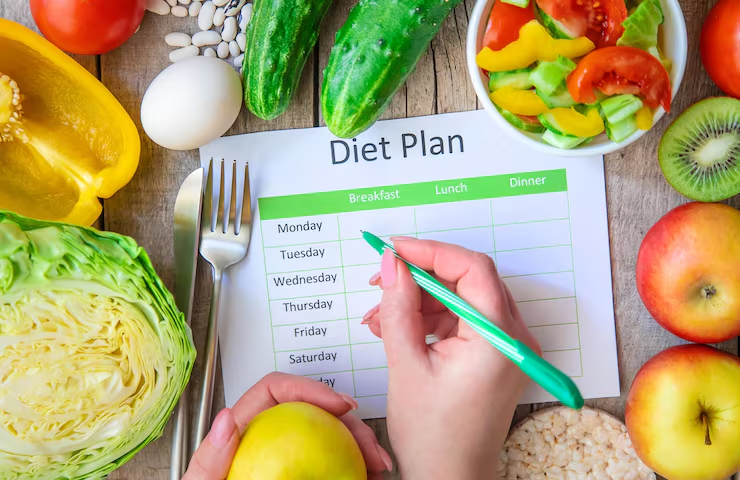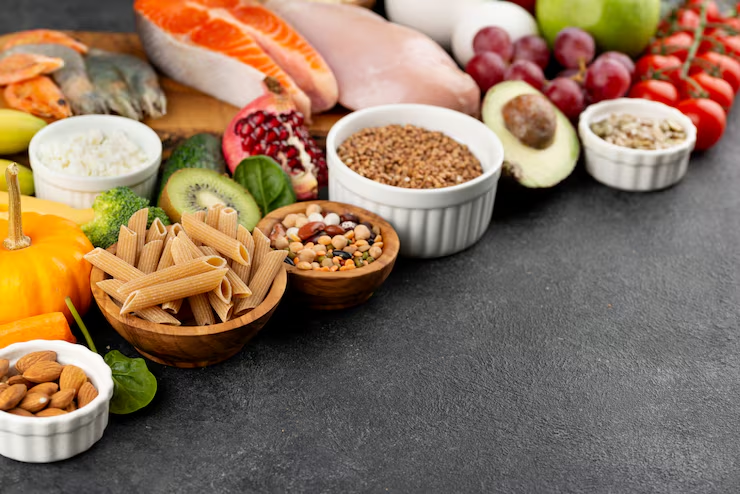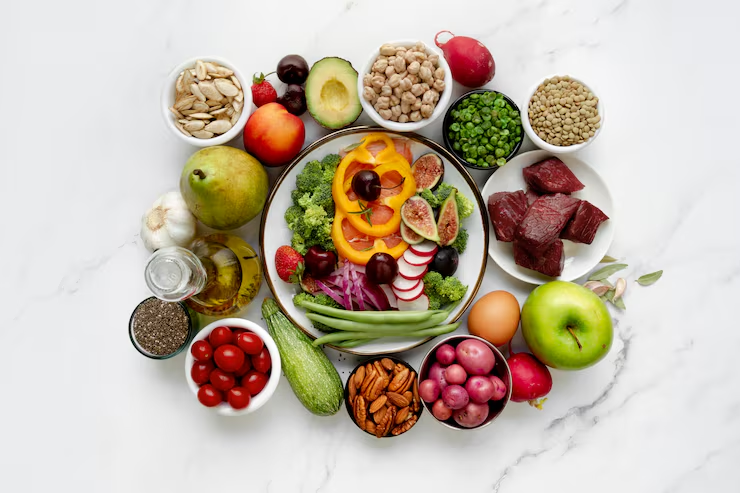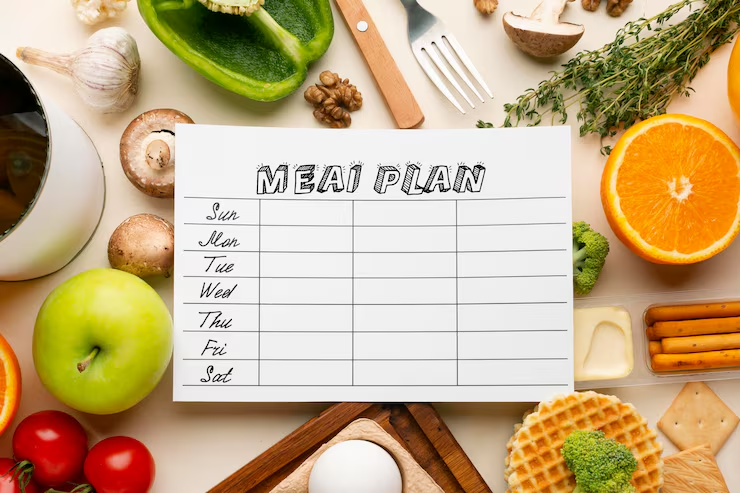Gaining weight in a healthy manner is just as important as losing weight. Many people struggle with being underweight due to high metabolism, lifestyle habits, or medical conditions. A weight gain diet plan can serve as a structured roadmap to help you increase your body mass safely and efficiently. Unlike fad diets or unhealthy methods, a well-designed plan focuses on nutrition-rich foods, balanced macronutrients, and sustainable lifestyle changes. 🥑🍗
A weight gain diet plan is not just about eating more; it is about eating smart. By incorporating nutrient-dense foods, high-quality proteins, complex carbohydrates, and healthy fats, you can gradually increase your muscle mass and body weight. It also helps improve your energy levels, strengthens immunity, and enhances overall well-being. People often make the mistake of eating junk food to gain weight, which may lead to unhealthy fat accumulation and other health risks. A structured plan ensures that you gain weight in a controlled, beneficial manner.
In today’s fast-paced world, many underweight individuals overlook the importance of a tailored weight gain diet . Such a plan does not just focus on calories but also on the timing of meals, portion sizes, and essential micronutrients. From breakfast to dinner, every meal can be optimized for weight gain without compromising health. Additionally, combining this diet with strength training can accelerate muscle gain and provide a balanced physique. Following a consistent weight gain diet plan can significantly improve your confidence, energy, and overall lifestyle.

What is a Weight Gain Diet Plan?
A weight gain diet plan is a structured dietary approach aimed at increasing body weight through healthy, nutrient-rich foods. Unlike indiscriminate eating, it focuses on caloric surplus while ensuring that your diet is balanced with proteins, carbohydrates, fats, vitamins, and minerals. This ensures that the weight gained is primarily muscle and not just fat. 🥩🍌
At its core, a weight gain diet plan involves consuming slightly more calories than your body burns daily. This extra energy is used for building muscle and replenishing energy stores. The diet includes foods like lean meats, dairy, whole grains, nuts, seeds, and healthy oils. Each meal is carefully planned to provide the right mix of macronutrients. For example, a post-workout shake may combine whey protein, banana, and peanut butter to enhance muscle recovery and growth.
Moreover, a weight gain diet is flexible and can be tailored to individual preferences, metabolic rates, and fitness goals. It emphasizes not only quantity but also the quality of calories consumed. Incorporating snacks, smoothies, and small frequent meals ensures steady weight gain without overloading the digestive system. This approach is ideal for those with fast metabolisms or busy lifestyles who find it challenging to meet daily caloric needs. Overall, a weight gain diet plan provides a strategic and sustainable method to achieve healthy weight gain. 🥜🍚
Why a Weight Gain Diet Plan is Important
A weight gain diet plan is essential for individuals who are underweight or struggling to achieve their desired body mass. Healthy weight gain improves overall vitality, strengthens the immune system, and enhances physical appearance. Without a structured plan, people may resort to unhealthy eating habits, which can lead to nutritional deficiencies or fat accumulation rather than muscle growth. 💪
Following a weight gain diet plan ensures that your body receives all essential nutrients needed for growth. Proteins, for example, are critical for repairing tissues and building muscle mass. Carbohydrates provide energy for workouts and daily activities, while healthy fats support hormone production, brain function, and cellular health. A well-planned diet balances these nutrients to promote steady, sustainable weight gain rather than sudden, unhealthy increases.
Additionally, a weight gain diet plan helps in boosting confidence and mental well-being. Being underweight can often affect self-esteem, energy levels, and social interactions. By following a tailored diet, you can achieve your ideal weight while maintaining overall health. Combining the diet with strength training further accelerates muscle development, ensuring that your weight gain contributes to a toned, fit body. Overall, this plan provides a roadmap for gaining weight in a safe, effective, and scientifically backed manner. 🥗🏋️♂️
Essential Points for a Successful Weight Gain Diet Plan
Consume Calorie-Dense Foods 🍚

One of the most critical strategies in a weight gain diet plan is consuming calorie-dense foods. Calories are the building blocks of body mass, and without a consistent surplus, gaining weight is nearly impossible. High-calorie foods like nuts, seeds, whole grains, dried fruits, avocados, and olive oil provide concentrated energy and essential nutrients. Including these foods in your daily meals ensures that you meet your caloric requirements without having to eat excessively large portions, making the process more manageable and sustainable.
A well-structured weight gain diet plan emphasizes not just quantity but quality. Eating foods rich in proteins, healthy fats, and complex carbohydrates ensures that the extra calories are used for muscle growth rather than unhealthy fat accumulation. For instance, a handful of almonds or a smoothie with peanut butter and banana can provide hundreds of calories in a single serving, supporting steady weight gain while supplying vitamins, minerals, and antioxidants. This approach is far more effective than relying on junk food, which may increase weight but compromise health.
Moreover, integrating calorie-dense foods into snacks and meals helps maintain a consistent caloric surplus throughout the day. By strategically planning your meals with foods like whole-grain pasta, brown rice, and fatty fish, your weight gain diet plan becomes easier to follow and more efficient. These foods fuel the body for workouts, support metabolism, and ensure a gradual, healthy increase in body weight over time.
Include Protein-Rich Foods 🥩
Protein is the cornerstone of muscle development and repair, making it essential in any weight gain diet plan. Proteins provide the amino acids required for building lean muscle mass, which is a healthier way to gain weight. Foods such as lean meats, eggs, dairy products, legumes, and protein powders should be consumed regularly. Including adequate protein in every meal ensures that your body has the necessary building blocks for muscle growth and recovery.
A proper weight gain diet plan not only includes protein but also optimizes its timing. Consuming protein after workouts can significantly enhance muscle repair and growth. Meals like grilled chicken with quinoa or a protein shake with milk and banana are excellent examples. By pairing proteins with complex carbohydrates, your body gets the energy it needs while simultaneously building muscle tissue efficiently. This approach ensures that weight gain is predominantly in the form of lean mass rather than fat.
Additionally, protein-rich foods play a crucial role in satiety and metabolic regulation. A high-protein weight gain diet plan prevents unwanted fat accumulation by balancing calorie intake and improving the body’s nutrient utilization. Over time, this results in a stronger, more toned physique with increased energy levels, improved strength, and overall better health outcomes. Protein is, therefore, a non-negotiable component of a successful weight gain strategy.
Eat Frequent, Balanced Meals 🥗

Consistency is key in a weight gain diet plan, and one effective way to achieve it is by eating frequent, balanced meals. Instead of three large meals, aim for 5–6 smaller meals throughout the day. This strategy ensures a steady supply of nutrients and calories to the body, promoting continuous muscle repair and growth. Balanced meals combining carbohydrates, proteins, and healthy fats keep energy levels stable and prevent excessive hunger, which can lead to unhealthy food choices.
Frequent meals also help those with high metabolisms reach their caloric targets more easily. A typical weight gain diet plan includes options like oatmeal with nuts for breakfast, a mid-morning smoothie, a protein-rich lunch, a healthy snack in the afternoon, and a nutrient-dense dinner. Each meal should contribute to the overall daily calorie and nutrient requirements, ensuring a consistent surplus needed for weight gain.
Moreover, eating regularly supports digestion and nutrient absorption. When your body receives a steady stream of nutrients, it can efficiently use them for muscle building rather than storing excess calories as fat. By planning meals strategically, a weight gain diet plan becomes sustainable, effective, and less overwhelming, helping individuals gain weight in a healthy, controlled manner.
Include Healthy Fats 🥜
Healthy fats are an essential component of a weight gain diet plan because they provide concentrated calories and vital fatty acids. Unlike unhealthy fats, sources like nuts, seeds, olive oil, avocados, and fatty fish deliver energy while supporting hormone production, brain health, and cellular function. Incorporating these fats into your meals ensures that your body receives high-quality calories, which promote lean muscle development and overall well-being.
A weight gain diet plan that includes healthy fats also improves the taste and satiety of meals. Fats slow digestion, allowing the body to absorb nutrients more effectively, and provide sustained energy throughout the day. For example, adding almond butter to smoothies, drizzling olive oil on salads, or snacking on walnuts provides essential calories without feeling overly full. This makes it easier to maintain a calorie surplus, which is critical for effective weight gain.
Additionally, healthy fats play a role in balancing hormones such as testosterone, which is vital for muscle growth. A weight gain diet plan that neglects fats may hinder muscle development and overall progress. By including sources of omega-3 and omega-6 fatty acids, your diet not only supports weight gain but also improves heart health, cognitive function, and long-term wellness.
Strength Training Integration 🏋️♂️

Exercise, particularly strength training, is a vital component of a weight gain diet plan. While diet provides the calories and nutrients necessary for growth, resistance exercises stimulate muscle development, ensuring that the weight gained is primarily lean mass. Compound movements like squats, deadlifts, bench presses, and pull-ups target multiple muscle groups and create the metabolic stimulus needed for efficient muscle growth.
A weight gain diet plan combined with structured workouts accelerates results by improving nutrient utilization. After a training session, consuming a protein-rich meal or shake helps repair muscle tissue and promote hypertrophy. This synergy between diet and exercise ensures that calories consumed are transformed into muscle rather than fat, leading to a stronger, more toned physique over time.
Moreover, incorporating strength training into a weight gain diet plan improves overall health, boosts metabolism, and enhances functional strength. Consistent workouts paired with calorie-dense, nutrient-rich meals ensure that your body composition improves in a balanced manner, making weight gain healthy, sustainable, and visually rewarding.
Hydrate Properly 💧
Hydration is often overlooked in a weight gain diet plan, yet it plays a crucial role in digestion, nutrient absorption, and overall metabolic efficiency. Drinking enough water ensures that your body can effectively process the calorie-dense foods necessary for weight gain. Proper hydration also supports muscle recovery after workouts, prevents fatigue, and maintains energy levels throughout the day. Including hydrating foods like fruits, smoothies, and milk can further enhance your daily fluid intake.
A well-structured weight gain diet plan recognizes that fluids are not just for quenching thirst—they are essential for transporting nutrients to cells, regulating body temperature, and maintaining optimal physiological functions. For example, consuming water with meals aids in digestion, while drinking protein shakes or smoothies after exercise helps replenish energy and repair muscles efficiently. Failing to hydrate properly can slow down the weight gain process, even if calorie intake is adequate.
Additionally, hydration supports the balance of electrolytes, which is vital for muscle function and overall health. For those following a weight gain diet plan, including electrolyte-rich beverages such as coconut water, milk, or sports drinks in moderation can enhance performance and recovery. By pairing proper hydration with nutrient-dense meals, individuals can optimize the results of their diet and exercise efforts, ensuring steady and healthy weight gain.
Monitor Progress and Adjust 📊

Monitoring progress is a critical part of any effective weight gain diet plan. Simply following a diet without tracking results may lead to stagnation or even unhealthy weight gain. By regularly measuring body weight, muscle mass, and strength levels, you can assess whether your current plan is working and make adjustments as necessary. Keeping a food diary or using apps to track calories ensures that your intake aligns with your weight gain goals.
A well-designed weight gain diet plan emphasizes personalization. Every individual has unique metabolism, activity levels, and nutritional needs, so what works for one person may not work for another. If weight gain stalls, increasing calorie intake, adjusting macronutrient ratios, or modifying meal timing can help resume progress. Regular monitoring provides the feedback necessary to tailor the plan for maximum effectiveness.
Moreover, monitoring progress helps maintain motivation and accountability. Seeing tangible results, such as improved muscle definition, increased strength, or steady weight gain, encourages adherence to the weight gain diet plan. It also helps identify patterns that may hinder progress, such as skipped meals or insufficient protein intake. By staying vigilant and adjusting as needed, you ensure that your weight gain journey is sustainable, efficient, and health-focused.
Include Nutrient-Rich Snacks 🍌
In a weight gain diet plan, snacks are not just fillers—they are a strategic tool to boost daily calorie intake and nutrient consumption. Nut butter sandwiches, protein bars, smoothies, trail mix, and yogurt with fruits can provide additional calories without making meals uncomfortably large. These snacks help maintain a steady caloric surplus, which is essential for gradual and sustainable weight gain.
Snacking also ensures that the body receives a constant supply of nutrients throughout the day. A weight gain diet plan focuses on high-quality snacks that combine proteins, healthy fats, and carbohydrates. For instance, a smoothie made with milk, banana, oats, and peanut butter provides essential vitamins, minerals, and calories in a convenient form. This approach supports energy levels, muscle repair, and overall growth while keeping hunger manageable between meals.
Furthermore, nutrient-rich snacks enhance adherence to a weight gain diet plan by offering flexibility and variety. Having prepared snacks on hand reduces the temptation to eat unhealthy fast food and ensures that you consistently meet your daily caloric goals. By strategically incorporating these snacks, individuals can steadily gain weight while promoting lean muscle development, maintaining health, and enjoying the weight gain process in a balanced and sustainable way.
Conclusion

A well-designed weight gain diet plan provides a structured, healthy approach to increasing body weight. Unlike random or unhealthy eating, it ensures that your body receives the right balance of proteins, carbohydrates, fats, and essential vitamins and minerals. Following this plan consistently not only promotes muscle growth but also enhances energy, immunity, and overall physical appearance. By choosing nutritious, high-calorie foods, you can gain weight gradually and sustainably. 🥑🥩
Furthermore, combining a weight gain diet plan with strength training accelerates results. Exercise ensures that the weight gained is predominantly lean muscle rather than fat. Tracking progress, adjusting portions, and incorporating nutrient-dense snacks further support your goals. With careful planning, even those with fast metabolisms or busy lifestyles can achieve significant results without compromising health.
Ultimately, a weight gain diet plan is more than a temporary diet—it is a lifestyle approach that promotes long-term wellness. By focusing on nutrient quality, meal timing, and balanced macronutrients, individuals can achieve a toned, healthy body while improving self-confidence. Following a structured plan ensures steady progress, making weight gain a rewarding and empowering journey.
FAQs
Q1: How quickly can I gain weight following a weight gain diet plan?
The rate of weight gain depends on your metabolism, activity level, and adherence to the plan. Typically, healthy weight gain ranges from 0.5–1 kg per week. Following a structured weight gain diet plan with calorie-dense foods, strength training, and frequent meals ensures gradual and sustainable results without harming your health.
Q2: Can I gain weight without exercise if I follow a weight gain diet plan?
Yes, you can gain weight without exercise by consuming more calories than your body burns. However, without exercise, the weight gained may be more fat than muscle. A proper weight gain diet plan combined with strength training maximizes lean muscle growth, making your weight gain healthier and more visually appealing.
Q3: Are there vegetarian options in a weight gain diet plan?
Absolutely! Vegetarian foods like lentils, chickpeas, paneer, nuts, seeds, and dairy products provide ample proteins and calories. A vegetarian weight gain diet plan can be customized to include nutrient-dense, high-calorie foods that promote healthy weight gain without relying on meat or animal-based products.
Q4: How important is meal timing in a weight gain diet plan?
Meal timing plays a crucial role in nutrient absorption and muscle growth. Consuming protein-rich meals post-workout, spacing meals evenly throughout the day, and having calorie-dense snacks ensures a constant supply of energy. This is a fundamental principle of a successful weight gain diet plan.
Q5: Can a weight gain diet plan help people with fast metabolism?
Yes, individuals with fast metabolism often struggle to gain weight. A structured weight gain diet plan ensures they consume enough calories and nutrients to overcome metabolic challenges. Combining calorie-dense foods, frequent meals, and resistance training helps slow metabolizers gain lean muscle efficiently and sustainably.


